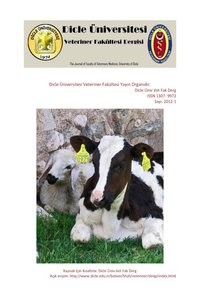Abstract
Paraneoplastic disorders are indirect and usually remote effects that are caused by tumor cell products rather than by the primary
tumor or its metastases. For this reason recognition of paraneoplastic syndrome is important for early tumor diagnosis, treatment of
metabolic abnormalities and management. Paraneoplastic syndromes are a group of noncancerous disease associated with internal
neoplasia. Paraneoplastic conditions result from production and release of substances (hormone, cytokines, peptides, growth factors)
that are not normally produced by the cell of origin of the tumor. Paraneoplastic syndrome commonly presents as dermatological
manifestations but can also be evident as cardiac abnormalities, neuromuscular changes, ocular changes, hematological changes as
well as general clinical signs of weight loss, poliuria, polydipsia, diarrhea and anorexia. A number of diseases can be result in
paraneoplastic syndrome, including: hypercalcemia, disseminated intravascular coagulation, weight loss, enteropathi,
gastroduodenal ulcer, hypoglisemi, hyperrgastrinemia and hyperhistanemia, hyperviscosity, anemia, eosinophilia, leucocytosis,
neurological syndrome, hypertrophic osteoartropathy and cuteneous syndrome.
Keywords
References
- 1. Abelev GI, Eraiser TL. (2008). On The Path To Understanding The Nature Of Cancer. Biochemistry, 73(5): 487-497.
- 2. Bergman PJ. (2012). Paraneoplastic Hypercalcemia. Topics in Compan An Med. 27: 156–158.
- 3. Bergman PJ. (2001). Paraneoplastic Syndromes. (Alınmıştır). Small Animal Clinical Oncology. Withrow SJ, MacEwen EG (Editörler). Baskı 3. s. 35-53. Saunders, Philadelphia, PA.
- 4. David JA, Malcolm JB, Turek MM. (2008). Paraneoplastik Syndrome. (2008). (Alınmıştır) Decision Making in Small Animal Oncology. David JA (Editör). Baskı 1. s. 19-44. Wiley-Blackwell, London.
- 5. Dobson JM, Lascelles B. (2003). BSAVA Manual of Canine and Feline Oncology. Baskı 2. British Small Animal Veterinary Association.
- 6. Finora K. (2003). Common Paraneoplastic Syndromes. Clin Tech Small Anim Pract. 18(2): 123-126.
- 7. Lorusso S, Ruegg C. (2008). The Tumor Microenvironment and Its Contribution to Tumor Evolution Toward Metastasis. Histchem Cell Biol. 130: 1091-1103.
- 8. McGavin J, Zaccary M. (2007). Pathologic Basis of Veterinary Disease. Baskı 4. s. 29-40. Mosby Elsevier.
- 9. Moris J, Dobson J. (2001). Paraneoplastic Syndromes. Small Animal Oncology. Baskı 1. s. 25-30. Blackwell Publishing, London.
- 10. Pelosof LC, Gerber D. (2010). Paraneoplastic Syndromes: An Approach to Diagnosis and Treatment. Mayo Clin Proc. 85(9): 838-854.
- 11. Turek MM. (2003). Cuteneous Paraneoplastic Syndromes in Dogs and Cats: A Review of The Literature. Veterinary Dermatology. 14: 279-296.
- 12. Paraneoplastic syndromes. Erişim: http://www.laboklin.de/pdf/en/lab_0802_p araneoplastic_syndromes.pdf Erişim tarihi: 14.01.2013
Abstract
Paraneoplastik bozukluklar primer tümör ve metastazlarından daha çok tümör hücrelerinin uzak dokularda neden olduğu
değişikliklerdir. Bu nedenle paraneoplastik sendrom tümörün erken tanısı, tedavisi ve metabolik değişikliklerin yönetimi açısından
önemlidir. Paraneoplastik sendrom tümörle ilgili kansorejen olmayan hastalık gruplarına verilen isimdir. Paraneoplastik durum
tümör orijinli hücreler hücreler tarafından normalde üretilmeyen bazı ürün ve maddelerle (hormon, sitokinler, peptidler, büyüme
faktörleri gibi) ilişkilidir. Köpeklerde paraneoplastik sendrom genellikle dermatolojik semptomlarla karakterizedir, fakat aynı
zamanda kalp anormallikleri, nörümüsküler, göz ile hematolojik değişiklikler ve de kilo kaybı, poliüri, polidipsi, ishal ve iştahsızlık
ta görülen değişikliklerdendir. En yaygın paraneoplastik sendrom: hiperkalsemi, dissemine intravasküler koagülasyon, kilo kaybı,
enteropati, gastroduodenal ülser, hipoglisemi, hipergastrinemi ve hiperhistanemi, hipervizkosite, anemi, eritrositozis, lökositozis,
trombositopeni, nörolojik sendrom, iskelet sistemine bağlı problemler ve kutenöz sendromdur.
Keywords
References
- 1. Abelev GI, Eraiser TL. (2008). On The Path To Understanding The Nature Of Cancer. Biochemistry, 73(5): 487-497.
- 2. Bergman PJ. (2012). Paraneoplastic Hypercalcemia. Topics in Compan An Med. 27: 156–158.
- 3. Bergman PJ. (2001). Paraneoplastic Syndromes. (Alınmıştır). Small Animal Clinical Oncology. Withrow SJ, MacEwen EG (Editörler). Baskı 3. s. 35-53. Saunders, Philadelphia, PA.
- 4. David JA, Malcolm JB, Turek MM. (2008). Paraneoplastik Syndrome. (2008). (Alınmıştır) Decision Making in Small Animal Oncology. David JA (Editör). Baskı 1. s. 19-44. Wiley-Blackwell, London.
- 5. Dobson JM, Lascelles B. (2003). BSAVA Manual of Canine and Feline Oncology. Baskı 2. British Small Animal Veterinary Association.
- 6. Finora K. (2003). Common Paraneoplastic Syndromes. Clin Tech Small Anim Pract. 18(2): 123-126.
- 7. Lorusso S, Ruegg C. (2008). The Tumor Microenvironment and Its Contribution to Tumor Evolution Toward Metastasis. Histchem Cell Biol. 130: 1091-1103.
- 8. McGavin J, Zaccary M. (2007). Pathologic Basis of Veterinary Disease. Baskı 4. s. 29-40. Mosby Elsevier.
- 9. Moris J, Dobson J. (2001). Paraneoplastic Syndromes. Small Animal Oncology. Baskı 1. s. 25-30. Blackwell Publishing, London.
- 10. Pelosof LC, Gerber D. (2010). Paraneoplastic Syndromes: An Approach to Diagnosis and Treatment. Mayo Clin Proc. 85(9): 838-854.
- 11. Turek MM. (2003). Cuteneous Paraneoplastic Syndromes in Dogs and Cats: A Review of The Literature. Veterinary Dermatology. 14: 279-296.
- 12. Paraneoplastic syndromes. Erişim: http://www.laboklin.de/pdf/en/lab_0802_p araneoplastic_syndromes.pdf Erişim tarihi: 14.01.2013
Details
| Subjects | Veterinary Surgery |
|---|---|
| Journal Section | Review |
| Authors | |
| Publication Date | January 1, 2013 |
| Published in Issue | Year 2013 Issue: 1 |


